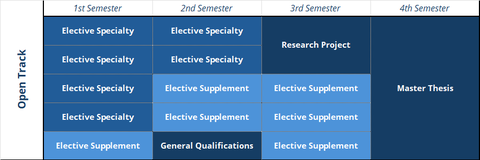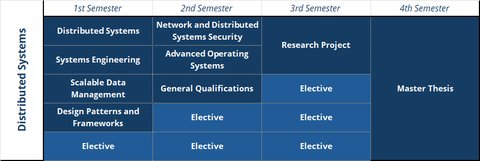Master's program Computer Science (starting from WiSe 2025/2026)
Table of contents
Goals
After you have learned the basics of computer science in your Bachelor's degree, the English-language Master's degree in Computer Science allows you to specialize. You can choose from a wide range of subject areas such as automation, artificial intelligence, software engineering, architecture of hardware and software systems, logical modeling, distributed system architectures or graphical data processing. The aim is to make you a specialist in your chosen subject areas who is also aware of the responsibility for the potential impact of computer science applications and systems.
After graduating, you can choose to pursue an academic career, teach about computer science and contribute to its further development. A research-oriented industrial career is also open to you, where you can contribute your knowledge to expert teams. As an M.Sc. student, you will be ready to acquire new areas of knowledge, structure them across domains, develop suitable models and thus further develop yourself.
Structure and content
The degree program has a modular structure and is research-oriented. The course provides you with both applied and academic expertise in the focus areas of your choice.
The courses are spread over four semesters, with the fourth semester reserved for writing your thesis and holding the colloquium. The third semester is designed in such a way that you can use it for a temporary stay at another university. You can also complete it as part-time study in accordance with the regulations for part-time study.
The degree program allows you to choose between two tracks - the Open Track and the Distributed Systems Engineering track.
Common to both tracks are the research project, which is completed in the 3rd semester, the modules of the compulsory elective area of general qualifications, in which you acquire skills in rhetoric, presentation, communication skills, social commitment or foreign language skills, as well as the Master's thesis, with which you complete your Master's degree.
Open Track
In the Open Track of the degree program, you can choose from 8 subject areas with a large number of compulsory elective modules, whereby modules from three subject areas worth 12 credit points each must be selected; the modules can only be selected if they have not already been selected in the compulsory elective area Supplement. The subject areas are as follows:
-
Knowledge Models (winter semester),
-
Model Checking (winter semester),
-
Advanced Theoretical Computer Science (summer semester),
-
Advanced Symbolic Artificial Intelligence (winter semester),
-
Advanced Problem Solving and Search (winter semester),
-
Complexity Theory (winter semester)
- Compiler Construction (winter semester),
- Self-Adaptive Software and Cobotics (winter semester),
- Foundations of Certified Programming Language and Compiler Design (winter semester),
- Immersive and Interactive Software Development (summer semester),
- Software Management and Quality Assurance (summer semester),
- Component-Based Software Engineering (summer semester),
- Advanced Software Engineering (winter semester),
- Requirements and Test Management (winter semester),
- Design Patterns and Frameworks (winter semester),
- Future-Proof Software Systems (summer semester),
- Model-Driven Software Development in Technical Spaces (winter semester)
- Foundations of Concurrent and Distributed Systems (summer semester) ,
- Privacy-Enhancing Technologies (summer semester),
- Software Fault Tolerance (summer semester),
- Confidential Computing (summer semester),
- Concurrent and Distributed Systems Lab (summer semester),
- Network and Distributed Systems Security (summer semester),
- Systems Security Lab (summer semester),
- IT Security in Cloud Computing (Summer semester),
- Security in Applications (Winter semester),
- Software Fault Tolerance Lab (winter semester)
- Systems Engineering (winter semester),
- Scalable Data Engineering (winter semester),
- Scalable Data Management (winter semester),
- Distributed Systems (winter semester),
- Service and Cloud Computing (winter semester),
- IoT Communication (winter semester),
- Advanced Computer Networks (winter semester),
- Wireless Sensor Networks (summer semester),
- Internet and Web Applications (summer semester),
- Resilient Systems (summer semester),
- Advanced Operating Systems (summer semester),
- Operating System Construction (summer semester),
- Microkernel Construction (summer semester),
- Microkernel-Based Operating Systems (winter semester),
- Engineering Adaptive Mobile Applications (winter semester),
- Internet Measurements (winter semester),
- Prediction and Estimation Techniques (winter semester),
- Decentralized Systems (winter semester)
- Foundations of Cyber-Physical Systems (winter semester, 2026 also in summer semester),
- Industrial Communications (summer semester),
- Cooperative Mobile Systems (summer semester, WS 2025/26 also in the winter semester),
- Cyber-Physical Systems Modeling Lab (summer semester, WS 2025/26 also in the winter semester),
- Vehicular Networking (summer semester, WS 2025/26 also in the winter semester),
- Model-Driven Automation (summer semester),
- Closed-Loop Control in Networked Control Systems (summer semester, WS 2025/26 also in the winter semester),
- Cyber-Physical Systems Modeling Lab Advanced (summer semester, WS 2025/26 also in the winter semester),
- Industrial Internet of Things (winter semester),
- Engineering and Management of Industrial Networks (winter semester),
- Industrial Cyber-Physical Systems Lab (winter semester)
- Foundations of Computer Graphics (winter semester),
- Foundations of Data Visualization (winter semester),
- Machine Learning (winter semester),
- Computer Vision (winter semester),
- Geometric Modeling and Animation (summer semester),
- Interactive Information Visualization (summer semester),
- Advanced Virtual Reality (summer semester),
- Scientific Visualization (summer semester),
- Creative Computing (summer semester),
- Physics Based Graphics (winter semester),
- Foundations of Virtual Reality (winter semester),
- Computer and Robot-Assisted Surgery (winter semester), and
- Large Language Models (winter semester)
- User Interface Engineering (winter semester),
- Advanced User Interfaces (summer semester),
- Multimodal User Interfaces (summer semester),
- OUTPUT.DD Live (summer semester),
- Audio Interfaces (summer semester),
- Applied Immersive Media (summer semester),
- Interactive Multimedia Information Retrieval (summer semester),
- Audio Processing (winter semester), and
- Experiments in Immersive Media (winter semester)
- High Performance Computing (winter semester),
- Performance Analysis of Computing Systems (winter semester),
- Efficient Parallel Algorithms (winter semester),
- Highly Parallel Programming of GPUs (winter semester),
- Adaptive Dynamic Systems Lab (summer semester),
- Structure and Operation Principle of Processors (summer semester),
- Digitization and Data Analytics (summer semester),
- Design and Programming of Embedded Multicore Architectures (summer semester),
- Introduction to Computer Engineering (winter semester),
- Hardware Modeling and Simulation (winter semester)
The supplementary elective area contains
- all compulsory elective modules in the above-mentioned subject areas,
- 11 non-computer science supplements (formerly called "minor subjects"), each with one basic and one specialization module as well as
- an analysis of a research topic module, which helps to prepare students for writing their final thesis.
Distributed Systems Engineering track
The Distributed Systems Engineering track enables you to analyze challenges in the field of distributed (software) systems, to design and develop solutions and to operate distributed (software) systems. The program provides both in-depth knowledge of the domain and a wide range of domain-specific aspects, such as software engineering, system architecture and security.
With the Distributed Systems Engineering track, you opt for a degree program with a predefined study path. In addition to the compulsory modules, there is a selection of track-specific compulsory elective modules from which you can choose modules worth 36 credit points:
- IoT Communication,
- Advanced Computer Networks,
- Self-Adaptive Software and Cobotics,
- Operating-System Construction,
- Cooperative Mobile Systems,
- Vehicular Networking,
- Component-Based Software Engineering,
- Internet and Web Applications,
- Wireless Sensor Networks,
- Foundations of Concurrent and Distributed Systems,
- Concurrent and Distributed Systems Lab,
- Software Fault Tolerance,
- Confidential Computing,
- Design and Programming of Embedded Multicore Architectures,
- Resilient Systems,
- Microkernel Construction,
- Decentralized Systems,
- Microkernel-Based Operating Systems,
- Future-Proof Software Systems,
- Internet Measurements,
- Engineering Adaptive Mobile Applications,
- Prediction and Estimation Techniques,
- Software Fault Tolerance Lab,
- Hardware Modeling and Simulation,
- Model-Driven Software Development in Technical Spaces,
- Requirements and Test Management
Degree
If you pass the Master's examination, you will be awarded the degree "Master of Science" (abbreviated to M.Sc.).
Application
Detailed information on the requirements for admission to the Master's degree course in Computer Science can be found on the Admission requirements website.
Further information
Study and examination regulations, regulations on the assessment of suitability
Student advisory service
Student council



